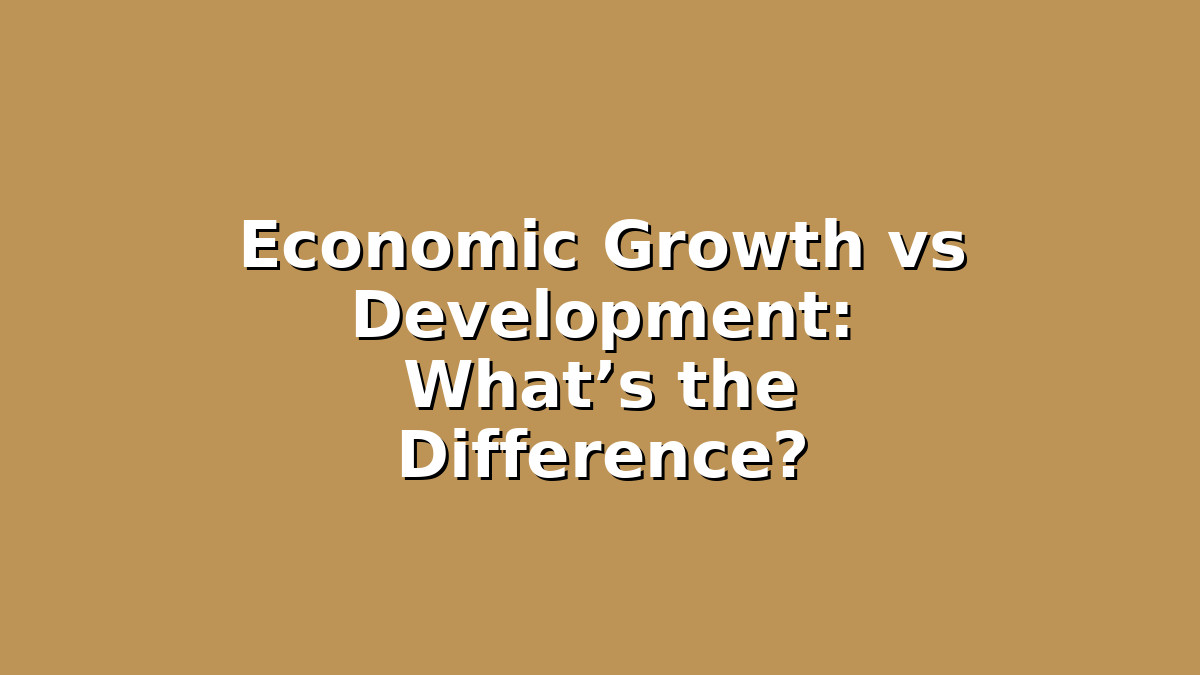When preparing for exams, especially in subjects like economics, geography, or social studies, understanding key concepts clearly can make a big difference in your performance. Two terms that often confuse students are economic growth and economic development. Although they might sound similar and are closely related, they have distinct meanings and implications. This article will help you grasp the difference between economic growth and development, explain why both matter, and offer practical study tips to master these topics effectively.
What is Economic Growth?
Economic growth refers to the increase in a country’s output of goods and services over a period of time, usually measured by the rise in Gross Domestic Product (GDP) or Gross National Product (GNP). In simple terms, it means a country is producing more than before, often indicating that businesses are expanding and more jobs are being created.
#### Key Features of Economic Growth:
– Quantitative in nature (measurable numbers like GDP).
– Focuses on the economy’s capacity to produce goods and services.
– Does not necessarily mean an improvement in living standards or quality of life.
– Can be driven by factors like technology, investment, labor force, and natural resources.
#### Study Tip:
When revising this topic, make sure to differentiate economic growth with clear examples. For instance, memorize that an increase in a country’s GDP from $1 trillion to $1.2 trillion signals economic growth. Use charts or graphs showing GDP trends over years to visualize growth better. Creating flashcards with key terms like GDP, GNP, and production can also help reinforce these concepts.
What is Economic Development?
Economic development is a broader, more qualitative concept. It includes economic growth but goes beyond it to evaluate improvements in living standards, education, health, and overall well-being of people in a country. It considers how wealth is distributed among the population and how it impacts poverty reduction, access to healthcare, and education opportunities.
#### Key Features of Economic Development:
– Qualitative and quantitative—measuring both economic output and social progress.
– Focuses on improving quality of life, not just numbers.
– Involves factors such as life expectancy, literacy rates, income equality, and infrastructure.
– Sustainable development and environmental considerations are often part of economic development.
#### Study Tip:
To master economic development, connect the concept with real-world indicators like the Human Development Index (HDI), poverty rates, and infant mortality rates. Compare countries with high GDP but low HDI (showing economic growth without development) to those making progress in both. Practice explaining why economic development matters more for citizens’ well-being than economic growth alone. Use case studies from your textbooks or recent news articles to make your answers richer and more insightful.
Why Understanding the Difference Matters for Exams and Beyond
Many exam questions will ask you to explain the difference or to analyze a country’s situation based on these concepts. Here’s why distinguishing between economic growth and development is essential:
– Answering Exam Questions Accurately: You can identify whether a question is asking about income increases (growth) or about improvements in welfare (development).
– Improving Critical Thinking: Understanding the limits of growth can help you discuss long-term economic policies and sustainability.
– Applying Knowledge to Current Events: Many countries experience growth without development, leading to inequality and social issues. Recognizing this helps you analyze real-world problems effectively.
#### Study Tip:
Practice writing short essays or bullet points that compare and contrast economic growth and development. Use past exam questions or create your own prompts. Form study groups to quiz each other and discuss these differences aloud—teaching concepts to others is one of the most effective ways to learn. Also, create mind maps linking terms like GDP, HDI, inequality, and infrastructure under the broader themes of growth and development.
Study Techniques to Master Economic Growth and Development
Here are three practical study strategies tailored to help you understand and remember these economic concepts effectively:
1. Visual Learning:
Draw comparison tables listing characteristics, indicators, and examples of economic growth versus development. Use colors to highlight differences, such as blue for growth and green for development. Infographics and videos from educational platforms can also simplify these topics.
2. Real-World Application:
Relate concepts to countries you are familiar with or currently in the news. For example, India’s rapid economic growth has not fully translated into development due to ongoing poverty and healthcare challenges. Discuss how policies affect both growth and development. This contextual learning makes abstract ideas more concrete and memorable.
3. Use Mnemonics and Acronyms:
Create simple memory aids to recall key points. For example, for economic development, remember “HEALTH” as a keyword:
– H – Healthcare improvements
– E – Education access
– A – Average income rise
– L – Life expectancy increase
– T – Technology adoption
– H – Housing and infrastructure
Such mnemonics can help during quick revision before exams.
Conclusion
Economic growth and economic development are both crucial concepts but represent different aspects of a country’s progress. Economic growth focuses on the increase in economic output, measured by GDP and other financial metrics. Economic development, however, emphasizes improved quality of life, social welfare, and sustainable progress.
For students preparing for exams, distinguishing these terms is vital for clear, accurate answers. Using study tips like visual aids, real-world examples, and mnemonic devices can boost your understanding and retention. Remember, mastering these concepts not only prepares you for exams but also equips you with a better grasp of global issues and economic policies.
Stay curious, keep practicing, and don’t hesitate to discuss these topics with peers or teachers—learning is always more effective when it’s interactive and engaging. Good luck with your studies!

Responses